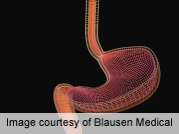In diabetes, gastric emptying remains stable over time

(HealthDay)—Gastric emptying of solids and liquids and gastrointestinal symptoms remain stable over time in patients with long-term type 1 and type 2 diabetes, according to a study published online Aug. 13 in Diabetes Care.
Jessica Chang, M.B.B.S., of the University of Adelaide and Royal Adelaide Hospital in Australia, and colleagues examined the natural history of gastric emptying in diabetes using data from 13 patients with diabetes (12 with type 1 and one with type 2). The participants had measurements of gastric emptying, blood glucose levels, glycated hemoglobin, upper gastrointestinal symptoms, and autonomic nerve function available from baseline and after 24.7 ± 1.5 years.
The researchers found no change in gastric emptying of solids or liquids, with gastric emptying at follow-up related to baseline emptying. Gastrointestinal symptoms also remained stable over time. Blood glucose concentrations were significantly lower at follow-up, and autonomic function deteriorated significantly.
"In summary, this prospective study indicates that gastric emptying in patients with long-term diabetes is relatively stable over time," the authors write.
More information:
Abstract
Full Text (subscription or payment may be required)
Copyright © 2012 HealthDay. All rights reserved.

















